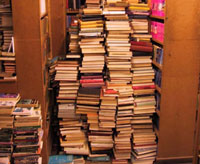 Though Wales is visited primarily for its magnificent scenery, impressive castles and charming sea-side resorts, the fourth most popular destination, attracting over a million visitors a year, is a little town on the River Wye, appropriately called Hay-on-Wye. A proliferation of book shops has earned the otherwise sleepy little town on the English border the title of "largest second-hand book shop in the world," for the whole town seems to be one massive collection of books, a bibliophile's dream.
Though Wales is visited primarily for its magnificent scenery, impressive castles and charming sea-side resorts, the fourth most popular destination, attracting over a million visitors a year, is a little town on the River Wye, appropriately called Hay-on-Wye. A proliferation of book shops has earned the otherwise sleepy little town on the English border the title of "largest second-hand book shop in the world," for the whole town seems to be one massive collection of books, a bibliophile's dream.
The whole thing began in the early 60's when resident Richard Booth opened an antique store in which he also sold some books. The books sold far better than the antiques and soon the clever entrepreneur was buying up every available piece of property in town to store and sell books. He bought the old cinema, the firehouse, the workhouse, a chapel and even the ruins of the ancient castle. It wasn't long before Mr. Booth began to advertise himself as "the world's biggest second-hand book seller." He began to attract attention from book lovers, not just from the urban conglomerations of Birmingham, Manchester and Bristol not that, but also to eventually draw connoisseurs (and the merely curious) from London and even overseas.
In the regal book-filled castle, high on its hill overlooking the main streets of the little town, Mr. Booth states, "Books are essentially an international and not a purely metropolitan market.... Books are a part of tourism and I want to give book selling a carnival images. I think a town where the bookshops are bigger than the supermarkets can be a major attraction because it is offering a retailing service that no other town in the world offers." He also informs us that even in the 17th century, Hay-on-Wye was a book town, allowing malefactors locked up in the stocks to read while they endured their punishment. Perhaps it is better that tourists do not know that the stocks were put together only by a local carpenter in the 1960's.
The initial success of Booth's books brought other book merchants to town eager to take advantage of the low rents and warehouse costs. Even Oxfam opened a second-hand bookshop, and Booth began to promote himself, becoming some kind of celebrity known for eccentricity and outrageous ideas. On April 1, 1977, disdainful of big business and government indifference to the fate of little towns in Britain, he declared Hay-on-Wye an independent state. He crowned himself king, issued passports for carefree travel, a local currency and petitioned the local town council to ban automobiles in favor of bringing back the horse to create employment for blacksmiths, grooms and stable-boys. When a fire destroyed much of the castle in the early 1980's "King Richard" was forced to sell many of his properties. Other booksellers were only too anxious to move into town, which continued to grow in reputation as the place to find any book you wanted, but couldn't find elsewhere.
In 1989, the first Hay-on-Wye Festival of Literature was held in the Welsh town that, thanks to Richard Booth, had firmly established itself in the world of books. Still living in his castle and presiding over the festivities, on April 4, 1998, the indefatigable Booth marked the 21st anniversary of his declaration of the town's independence by being crowned Emperor of all Book Towns. Stephen Davies, the first person to be born in the town following the declaration, carried out the ceremony, attended by former ministers and peers of Hay Street Theatre. The festivities included workshops in banner and lantern making and were preceded by a procession and fireworks.
The proliferation of antique shops and restaurants that have sprung up in the shadow of the second-hand bookshops has led to declining towns in other parts of Britain and abroad to seek Booth's assistance. So far, 30 towns in Europe and another 30 in the US have taken advantage of his ideas and promotional schemes.
点击查看本频道更多精彩内容